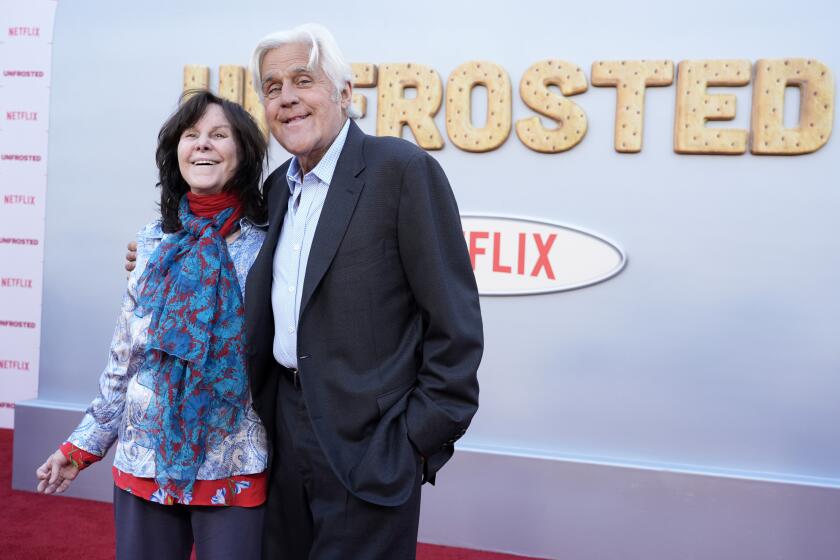Hollywood May Take the Drama Out of Settling Disputes
- Share via
An era of labor-management peace in the nation’s film and television industry just might come out of last year’s devastating writers’ strike.
The corporate giants and tens of thousands of employees suffered such heavy losses from the strike that industry and union leaders alike at last seem to realize that it doesn’t make sense to bash each other every time their contracts expire.
The impressive unity of members of the Writers Guild of America shut down the industry for 154 days, the longest strike in Hollywood history. It ended Aug. 5, but the aftershocks rumbled on till December, as the networks continued using reruns until full production resumed.
The compromises that ended the acrimonious struggle left both sides claiming that they were content with the settlement. But now they talk earnestly about avoiding another one.
Film industry workers aren’t strike-happy. The Screen Actors Guild, for instance, has had only five major strikes in its 56-year history. When they come, though, they are dillies.
Former President Ronald Reagan exaggerated only slightly when as SAG president in 1960 he said the actors’ union is the only one that doesn’t have to put up picket lines when it strikes; the members just stay in bed and production stops.
Even without strikes, though, the industry suffers when contract deadlines near. Studios either race at great cost to complete films or don’t start productions that might not be finished before a potential strike.
The first harbinger of a less confrontational future came last month when SAG and the American Federation of Television & Radio Artists reached agreement with the industry more than three months before the expiration of their contracts.
The industry had already started going into its usual, expensive pre-strike preparation when SAG Executive Director Ken Orsatti offered what sounded like a hard-line contract proposal.
However, it was a realistic proposal that included concessions management had already won from the writers and other unions. In return, the industry only had to give some good but hardly exorbitant increases to the actors.
The industry accepted. The actors’ pact was historic because never before had a film industry agreement been reached so early. But two other factors offer the real hope for less adversarial relations:
- Broadcast TV networks, the biggest buyers of films, are losing huge hunks of their markets to pay TV, cable, videocassettes and independent TV stations. The networks cannot rationally risk more market losses and so should put heavy pressure on the studios to avoid another crippling strike if at all possible.
- Cooperative union-management committees are being created to discuss problems as they arise and possibly resolve them before they reach a crisis stage and become strike issues. Some unions have had labor-management committees before but rarely used them.
For starters, the committees should deal with that perennial problem of residuals, the additional money paid to actors and others when the films or shows they work on are repeated or sold to other outlets such as videocassettes.
Complex formulas are used to determine the amount of the residuals, and the formulas vary. The one for sales to free TV differs from the one used for, say, videocassettes.
As sales increase in one market and decrease in another, actors and others who get residuals will certainly want to review the old formulas.
Why? Last year, for instance, so-called supplemental markets such as videocassettes paid actors $29 million while sales of theatrical films to free TV brought them $19 million. Eight years ago, the situation was reversed.
Revising the formulas might mean more money for residual earners, so why not start now to work out solutions to that and other problems?
A peaceful future isn’t assured. There are factors that might work against that happy day.
Not too many years ago, movie moguls such as Jack Warner and Sam Goldwyn loved to make barrels of money, but also loved making movies. Both of their joys stopped when labor troubles halted production.
These days, corporate tycoons own conglomerates that include businesses other than studios and networks. They may enjoy movie-making, but money seems to be their primary goal. So if production is stopped by a film industry strike, their income may be slowed, but money can still roll in from other sources.
That means they could afford to be hard-nosed about film industry union contracts even if it means taking a strike.
Coca-Cola, owner of Columbia, could keep earning money from sales of soft drinks and other products. Walt Disney’s Disneyland, Disney World and other non-film production operations would continue bringing in a bundle for Disney.
But these companies, too, presumably learned from the writers’ strike that there ought to be a better way to make money than battling with their employees.
Some strikes may be unavoidable. The one that gained residuals was certainly worth it to the actors, who have earned $1.2 billion in residuals since they began in 1952.
But for now, at least, union and management leaders are talking about more intelligent ways of settling their inevitable differences over who will get how much of that huge money pie their joint efforts produce.
More to Read
The biggest entertainment stories
Get our big stories about Hollywood, film, television, music, arts, culture and more right in your inbox as soon as they publish.
You may occasionally receive promotional content from the Los Angeles Times.










